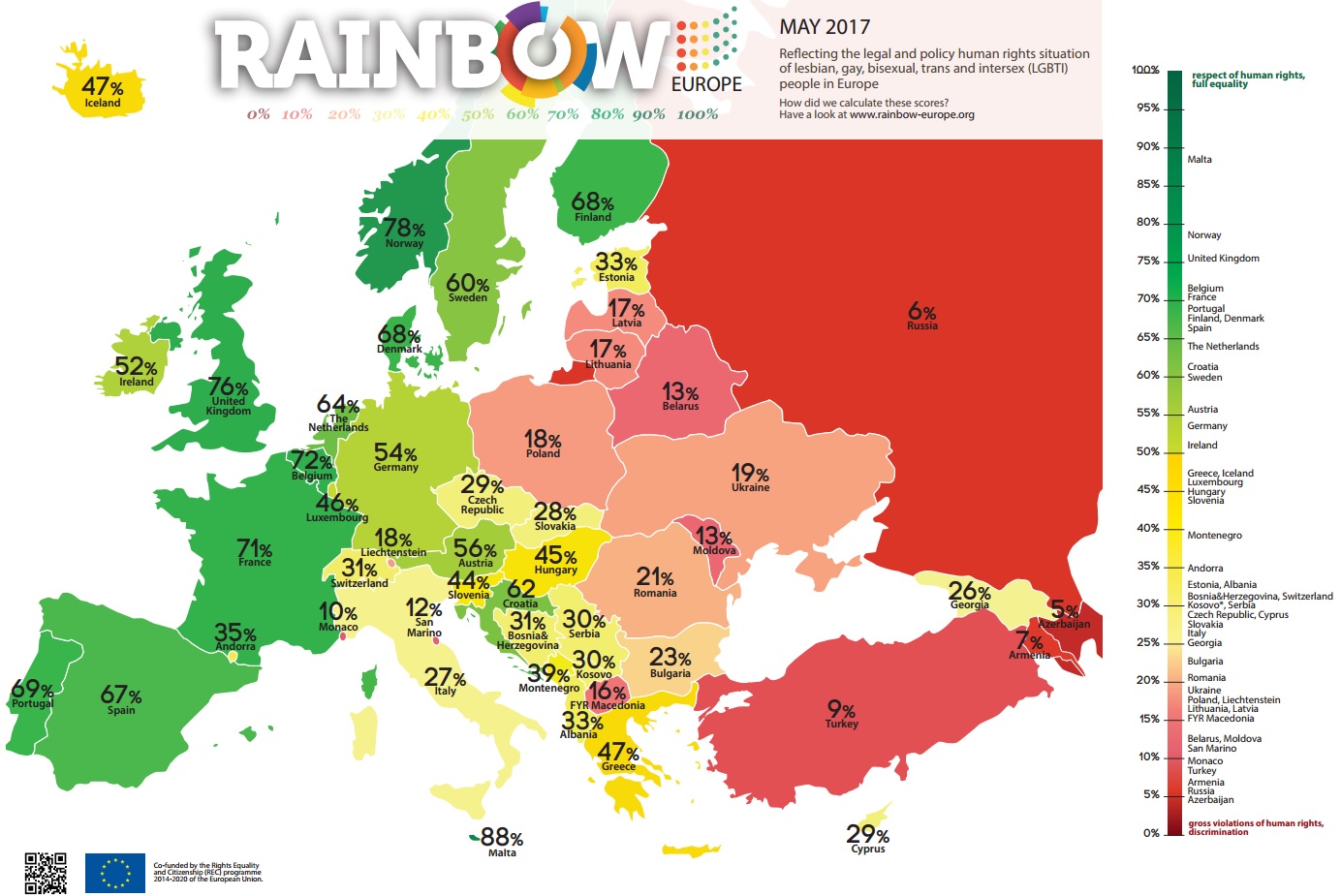International Day against Homophobia: top European countries where LGBT community faces most discrimination
International Day against Homophobia, Transphobia and Biphobia is celebrated worldwide on May 17. Despite efforts made by various organisations to fight the hatred against homosexuals, transgenders, transsexuals and bisexuals, the LGBT community keeps fighting the intolerance in the society. Nevertheless, the UK comes third in a European ranking of countries where sexual minorities feel most tolerated.
In 72 countries worldwide, sexual relationships between men are still being incriminated, and in 45 of those, the law is applicable to both men and women.
Moreover, at the moment, eight UN-member countries have the death penalty for intimate relationships between same-sex partners. In four of these (Iran, Saudi Arabia, Yemen and Sudan), the capital punishment in such situations is valid over their whole territory, while in other two countries (Somalia and Nigeria) it is implemented only in certain provinces.
In Iraq and the territories occupied by the Daesh group in northern Iraq and northern Syria, the punishment is implemented by local authorities or even various non-state actors, a recent report by the International Lesbian, Gay, Bisexual, Trans and Intersex Association (ILGA) shows. In 14 other countries, the punishment can be prison time of up to 14 years.
On a global level, 23 countries recognise marriage between same-sex people, while in 28 countries, such persons can have a civil partnership.
Moreover, almost 30 countries allow for same-sex couples to adopt children.

An ILGA poll at the end of last year, which included almost 98,000 people worldwide, showed that 19% of respondents would feel ”very uncomfortable” if they knew one of their neighbours is gay or lesbian. 16% confessed they would feel ”rather uncomfortable”, while 65% said they would not be concerned if they would be in a situation of this kind.
15% of the participants in the study declared they would feel ”very uncomfortable” if they were unable to figure out the gender of their neighbour at first glance. 21% noted that the situation would be ”rather uncomfortable”, while 64% declared that this aspect would not interest them.
Asked whether they would be upset if their son/daughter would fall in love with someone of the same sex, 40% admitted they would be ”very upset”, 28% that they would be ”rather upset” and 32% that they would not be upset.
The proportions differ, though, when taken into considerations the responses per region: in Africa, the percentage of those that declared themselves ”very upset” rises to 62%, and in Asia, it increases to 52%. In America, the percentage is 29%, in Europa of 30% and in Oceania it is of 16%.
On a global level, 47% and 42% of the respondents, respectively, consider it is unacceptable for a boy to dress up or behave as a girl and the other way round.
Regarding same-sex marriage, 45% of the respondents declared that it should not be legal, 32% declared they approve it, and 23% responded: ”I don’t know”.
On a European level, Azerbaijan, Russia and Armenia are the frontrunners in the ranking of countries where LGBT rights are most violated.
These are followed by Turkey, Monaco, San Marino, Moldova, Belarus, Macedonia and Latvia, according to research conducted by ILGA-Europe.
At the opposite end, the most tolerant countries in this aspect are Malta, Norway, Great Britain, Belgium, France, Portugal, Finland, Denmark, Spain and The Netherlands.
On the other hand, a Eurobarometer poll published last year showed that 45% of people in the EU member countries “totally agree” that homosexuals, lesbians and bisexuals should enjoy the same rights as heterosexuals.
41% declared they “totally agree” that same-sex relationships are normal, and 38% “totally agree” with same-sex marriages.
Nevertheless, one in eight respondents said they would feel uncomfortable if they had to work alongside someone from the LGBT community, and 35% – if they son or daughter would be involved in a same-sex relationship.
When it comes to public display of affection from a heterosexual couple, 72% of respondents declared they would feel comfortable or would be indifferent to such a scene. On the other hand, nearly a third of respondents confessed they would be uncomfortable if they would assist such a scene from a couple of gay men or from lesbians.